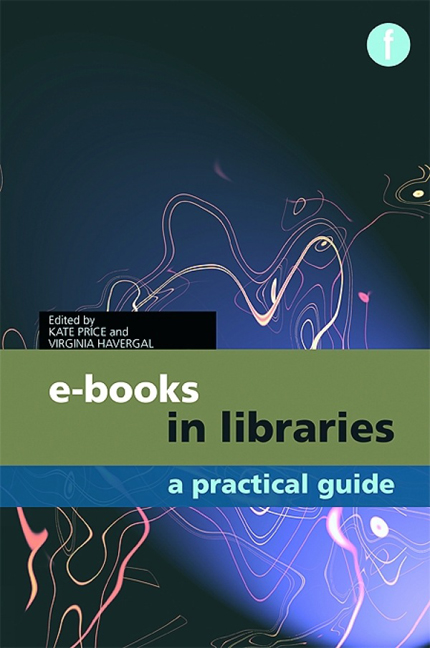Book contents
- Frontmatter
- Contents
- Preface
- The contributors
- Editors’ note
- Introduction
- Part 1 The production and distribution of e-books
- Part 2 Planning and developing an e-book collection
- Part 3 Delivering e-books to library users
- Part 4 Engaging readers with e-books
- 11 Public library users connecting with e-books
- 12 Engaging students with e-books in further education
- 13 Engaging staff and students with e-books in a university setting
- Part 5 The future of e-books
- Part 6 Useful information
13 - Engaging staff and students with e-books in a university setting
from Part 4 - Engaging readers with e-books
Published online by Cambridge University Press: 08 June 2018
- Frontmatter
- Contents
- Preface
- The contributors
- Editors’ note
- Introduction
- Part 1 The production and distribution of e-books
- Part 2 Planning and developing an e-book collection
- Part 3 Delivering e-books to library users
- Part 4 Engaging readers with e-books
- 11 Public library users connecting with e-books
- 12 Engaging students with e-books in further education
- 13 Engaging staff and students with e-books in a university setting
- Part 5 The future of e-books
- Part 6 Useful information
Summary
Introduction
This chapter outlines the strategies in place at the University of Portsmouth that have led to a 1700% increase in e-book use between 2004–5 and 2009–10, with just under 2 million pages viewed in the 2009–10 academic year. Results from a 2009 survey of 1111 students are presented, together with a brief snapshot of feedback from academic staff as well as ebrary usage statistics, all of which help to provide a summary of the state of engagement with e-books at Portsmouth.
An online survey about e-book use carried out at the University in 2005 elicited 110 responses from students. In contrast to results obtained in several other surveys of e-book use in universities (e.g. Abdullah and Gibb, 2006; Briddon et al., 2009), the largest percentage of replies (40%) was from the Faculty of Humanities and Social Sciences, and the next largest from the Faculty of Technology (at 24%). The response rate suggested that Humanities and Social Sciences students were heavy users of e-books, and this was confirmed by tracking Athens account prefixes and ebrary log-ins by department. This is a departmental usage pattern that has been prevalent at Portsmouth ever since.
Meanwhile, Portsmouth has had the second highest ebrary use of all UK universities for three consecutive years. It was decided to investigate the reasons behind this clear indication of the enthusiasm for e-books at Portsmouth, so the faculties with the highest usage rates were selected for a survey in spring 2009.
Background context
The University of Portsmouth is a post-1992 university with 21,000 students, including distance learners located both in the UK and around the world. There are five faculties which are, in order of size: Humanities and Social Sciences (HSS); Science; Business; Technology; and Creative and Cultural Industries. There are five faculty librarians, plus a law librarian, who are responsible for stock selection, academic liaison and information literacy training for their particular faculty or department.
In 2004 the Library began a trial of e-books, and by spring 2009 there were around 40,000 titles available, the bulk of which were from ebrary's Academic Complete collection, but also included 2000 titles purchased from MyiLibrary and around 100 books from NetLibrary. The University Library has purchased no e-books for handheld reader devices as yet.
- Type
- Chapter
- Information
- E-books in LibrariesA practical guide, pp. 237 - 252Publisher: FacetPrint publication year: 2011
- 3
- Cited by



